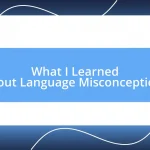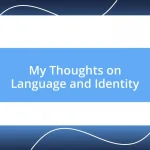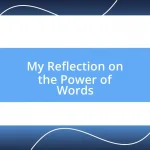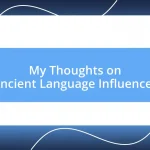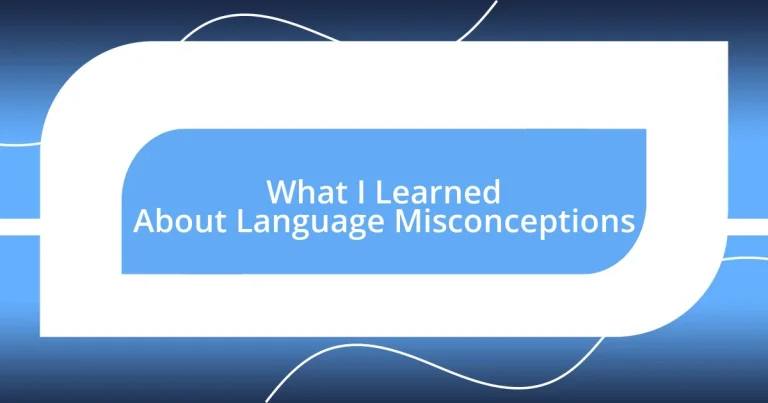Key takeaways:
- Misconceptions about language can lead to unfair judgments, impacting individuals’ self-esteem and communication abilities.
- All accents and dialects are valid expressions of culture, and there is no single ‘correct’ way to use language; it constantly evolves.
- Open conversations and challenging stereotypes can foster appreciation for linguistic diversity, enhancing understanding and collaboration.
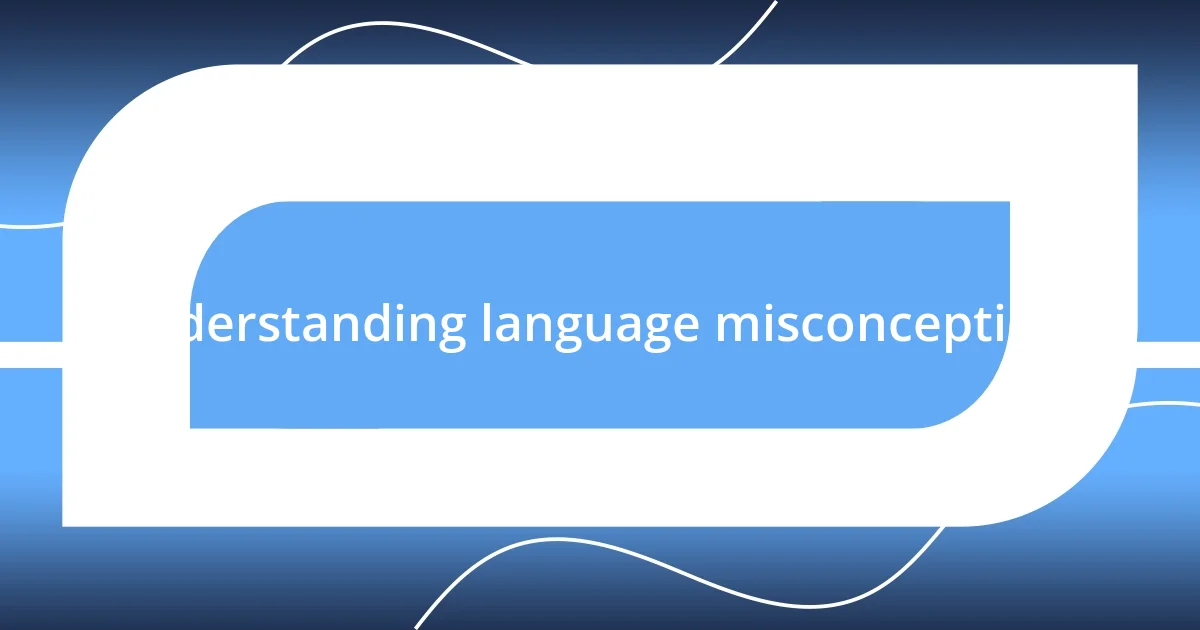
Understanding language misconceptions
Language misconceptions are often rooted in our everyday experiences, and I’ve found that they can shape not only how we communicate but also how we perceive each other. For instance, I remember a time when a friend of mine insisted that using “ain’t” was a surefire way to sound uneducated. It made me ponder: why do we connect certain words or dialects with intelligence? This idea of ‘standard language’ can be misleading, suggesting that those who don’t adhere to it lack worth, which simply isn’t true.
Another fascinating aspect I’ve noticed is how people frequently believe that learning a language means simply mastering vocabulary and grammar rules. However, I’ve learned through my own language-learning journey that culture plays an integral role. When I tried picking up French, it wasn’t just about conjugating verbs; understanding nuances, idiomatic expressions, and social contexts transformed my ability to communicate effectively. Isn’t it amazing how language is so intertwined with culture?
Misunderstandings about language can also lead to judgments we make about others. I once met someone who spoke with a strong accent, and before I got to know them, I hesitated, thinking they might struggle to articulate ideas. This experience taught me that such misconceptions can often lead to undue biases. How much more could we learn if we approached conversations without preconceived notions about how someone “should” sound?
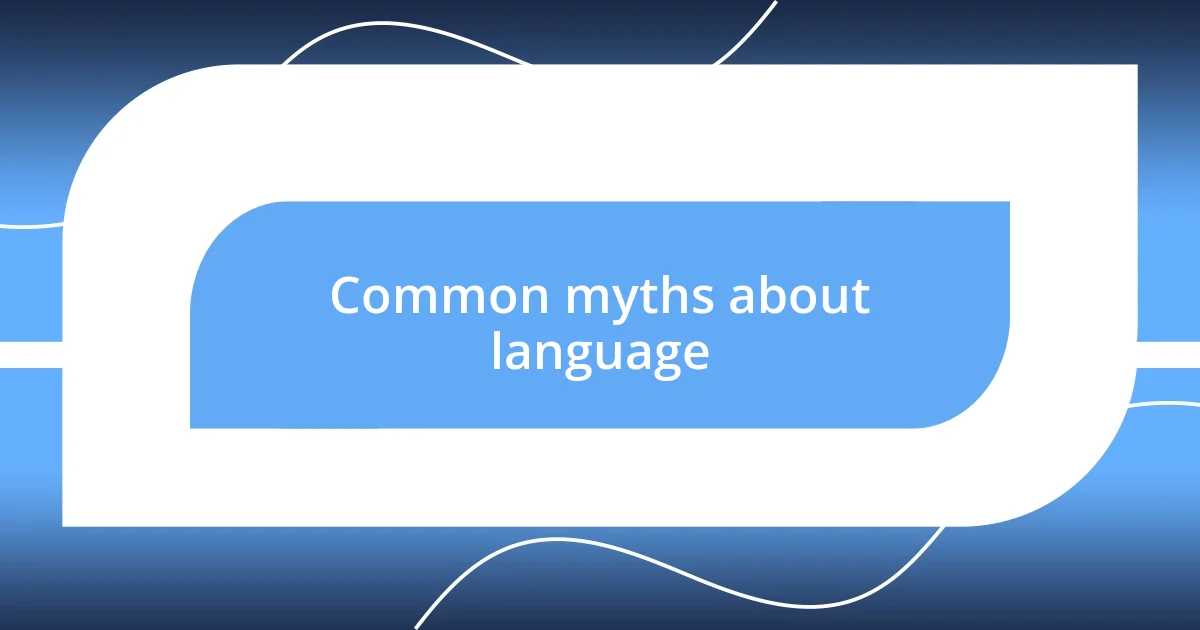
Common myths about language
When it comes to language, one persistent myth is that some accents are superior to others. I remember sitting in a café once, overhearing a group of people ridicule another’s thick regional accent. It struck me how perceptions of linguistic prestige can affect someone’s sense of identity. This experience deepened my understanding that all accents are valid; they carry history and culture, and that alone makes them worthy of respect.
Another myth I often encounter is the idea that bilingualism confuses children. Reflecting on my neighbor’s experience, who raised her kids to be bilingual, I saw firsthand that these children didn’t struggle. Instead, they developed a remarkable ability to switch between languages with ease. It was inspiring to witness their linguistic dexterity, which showed me the cognitive and social benefits of being multilingual rather than the confusion that many people seem to believe in.
People often claim that there’s a ‘correct’ way to use language, implying that certain slang or colloquialisms are improper. I vividly recall a heated discussion during a writing workshop where someone criticized the use of “YOLO” in creative writing. I couldn’t help but think of the joy and energy it brings to conversations. This made me realize that language is always evolving, and what may seem like poor usage today could very well be the norm tomorrow. It’s a testament to the richness of human expression.
| Myth | Reality |
|---|---|
| Accents indicate intelligence | All accents are valid and reflect cultural history |
| Bilingualism confuses children | Bilingual children often show cognitive advantages |
| There is a ‘correct’ way to use language | Language is constantly evolving and adapting |
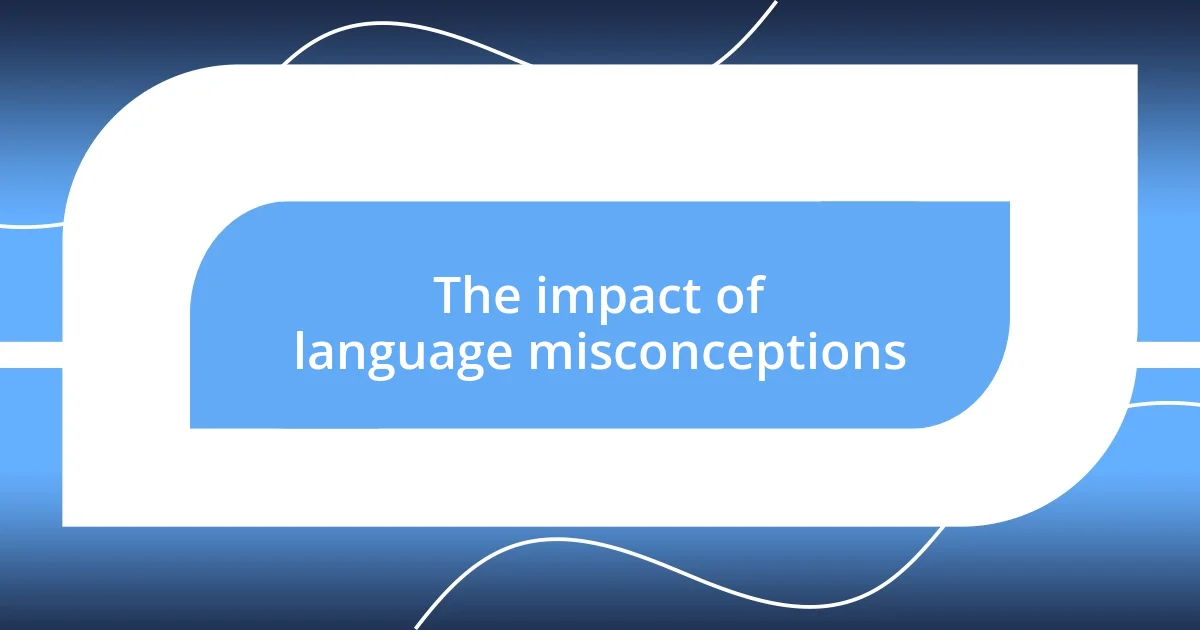
The impact of language misconceptions
Language misconceptions can have profound effects on our daily interactions and relationships. I recall a moment in college when a classmate apologized for their “broken English.” It was a powerful reminder that many individuals internalize societal misconceptions, feeling inferior due to their language skills. This situation made me realize how damaging misconceptions can be, reinforcing feelings of inadequacy instead of celebrating diverse communication styles.
Here are some key impacts of language misconceptions:
- Judgment and Bias: People may form opinions about others based on their language use, leading to unfair stereotypes.
- Sense of Identity: Misconceptions can cause individuals to feel ashamed of their accent or dialect, impacting their self-esteem and cultural pride.
- Communication Barriers: Misunderstandings about language can lead to misinterpretation, reducing effective communication and fostering isolation.
I’ve also seen how these misconceptions can hinder collaboration. At a previous job, a talented colleague hesitated to share ideas during meetings because they worried about grammar. I found it disheartening; their insights were valuable, and the misconceptions kept them from having a voice. Language is a tool for connection, and misconceptions often obscure that critical truth.
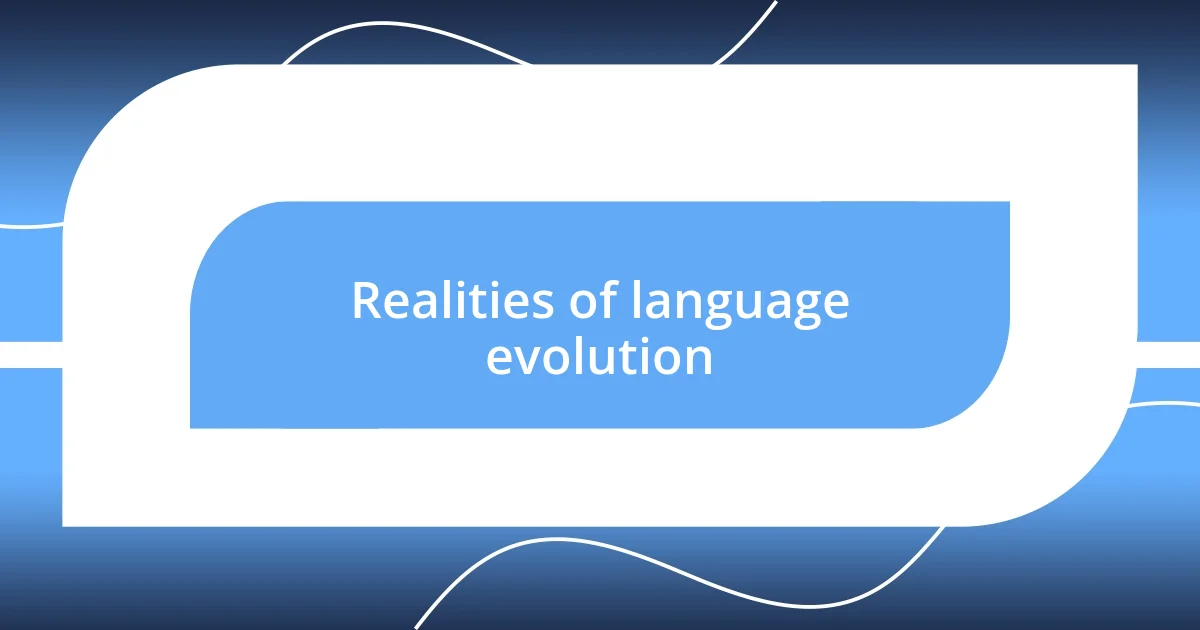
Realities of language evolution
Language evolution is a fascinating process influenced by countless factors, including culture, technology, and social interaction. I often think about how I must adapt my vocabulary and expressions when speaking with different groups of friends—what’s considered casual among my peers might not resonate in a formal setting. It begs the question: how do we define what’s correct or appropriate? The answer often lies in context and the speakers involved.
I remember exploring regional dialects during a road trip through New England. Each state had its unique phrases that not only reflected local culture but also showcased how language can create bonds. It was such a refreshing reminder of how language evolves to suit the needs and experiences of its speakers. This diversity in expression enriches our communication rather than constrains it.
Over time, I’ve come to appreciate that innovations in language—like the introduction of new slang or the adoption of words from different languages—reveal our collective creativity. When my younger cousin started using TikTok slang, I initially felt like it was distancing us. Yet, I realized it was simply a reflection of her generation’s exposure to different contexts and communities. Isn’t it interesting how language can serve as both a barrier and a bridge, connecting us through shared experiences while also evolving in ways that can feel foreign?
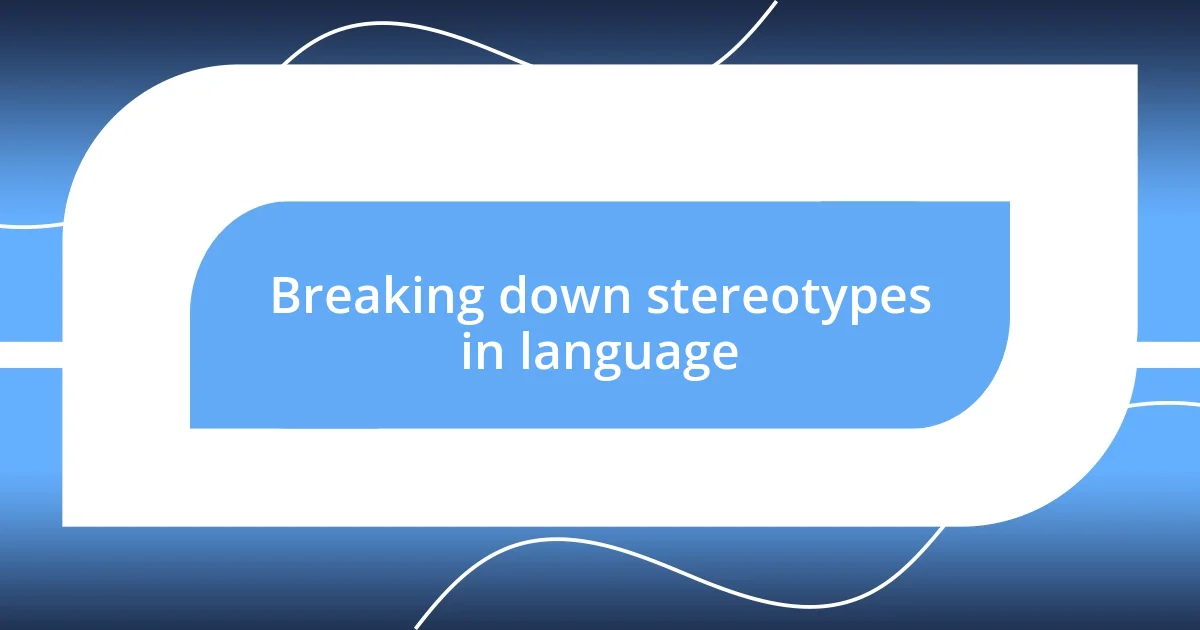
Breaking down stereotypes in language
When I think about language stereotypes, I can’t help but remember my experiences in a multicultural workplace. A colleague from Brazil often joked about his accent, saying it made him sound less intelligent. I found it heartbreaking; he was one of the most knowledgeable people in our team. This made me wonder—how many brilliant ideas go unshared because of such self-imposed barriers?
In conversations, I’ve seen people assume someone’s abilities based solely on their language proficiency. I once attended a networking event where a non-native English speaker expressed groundbreaking ideas. Initially, some people dismissed them, focusing on their pronunciation rather than the content. It made me reflect on how often we let superficial judgments cloud our perception of someone’s skills and insights. Isn’t it ironic how language can divide us when it should unite us?
I challenge myself to confront these stereotypes actively. Whether I’m mentoring newcomers or just chatting with friends, I try to highlight the beauty and strength in different accents and dialects. I recall a dinner where I asked a friend to share some phrases from their native language. The joy and pride in their eyes as they spoke was infectious. It’s moments like these that remind me: there’s so much richness in diversity that we often overlook. Why not celebrate these differences instead of letting them create walls?
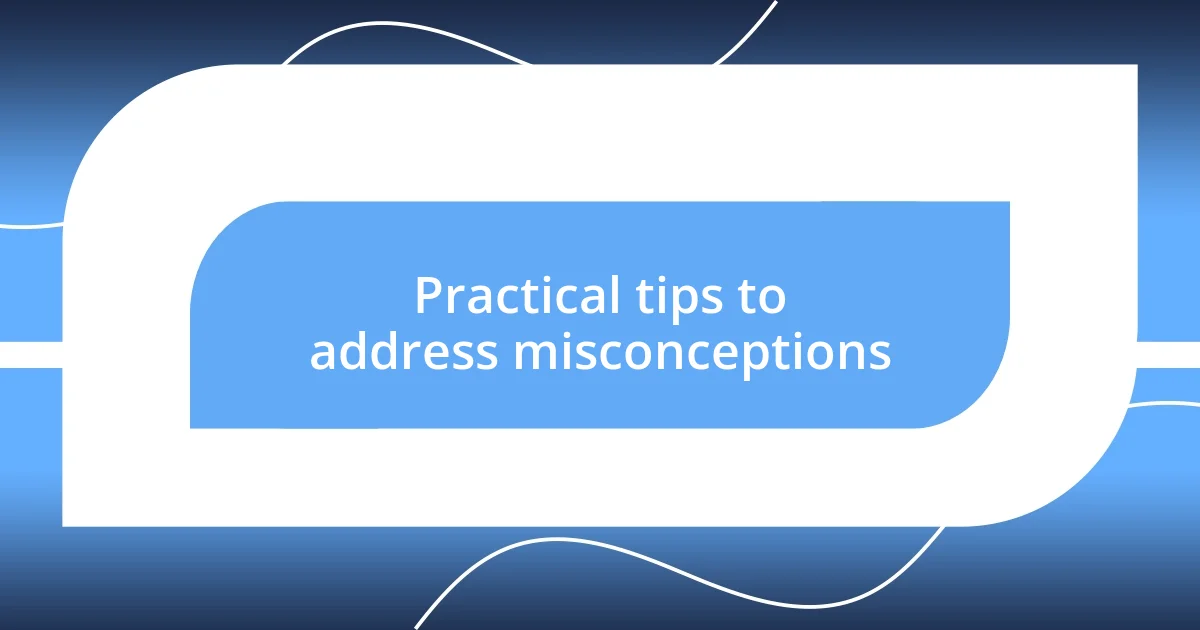
Practical tips to address misconceptions
When addressing language misconceptions, I find it valuable to foster open conversations. For instance, during a book club discussion, a member mentioned how they felt intimidated by complex terminology. I encouraged them to ask questions, which opened the door to shared learning. Isn’t it amazing how simply inviting curiosity can break down barriers and dispel fears about language skills?
Another practical tip is to actively challenge stereotypes in everyday interactions. I remember a time when I overheard people dismissing someone’s insights based purely on their accent. It struck me that their experiences were so valuable, regardless of how they articulated them. Why is it that we let superficial elements dictate our perceptions? I’ve made it a point to share alternate perspectives—sometimes, a reminder that everyone brings unique knowledge can shift the narrative.
Lastly, I’ve all learned the power of using social media platforms to highlight linguistic diversity. I once shared a video of a friend speaking in their native language, with subtitles to engage a broader audience. The comments section exploded with curiosity and appreciation! Isn’t it fascinating how technology can amplify voices and create understanding? By showcasing different languages and dialects, we cultivate an appreciation for linguistic diversity and dismantle misconceptions.
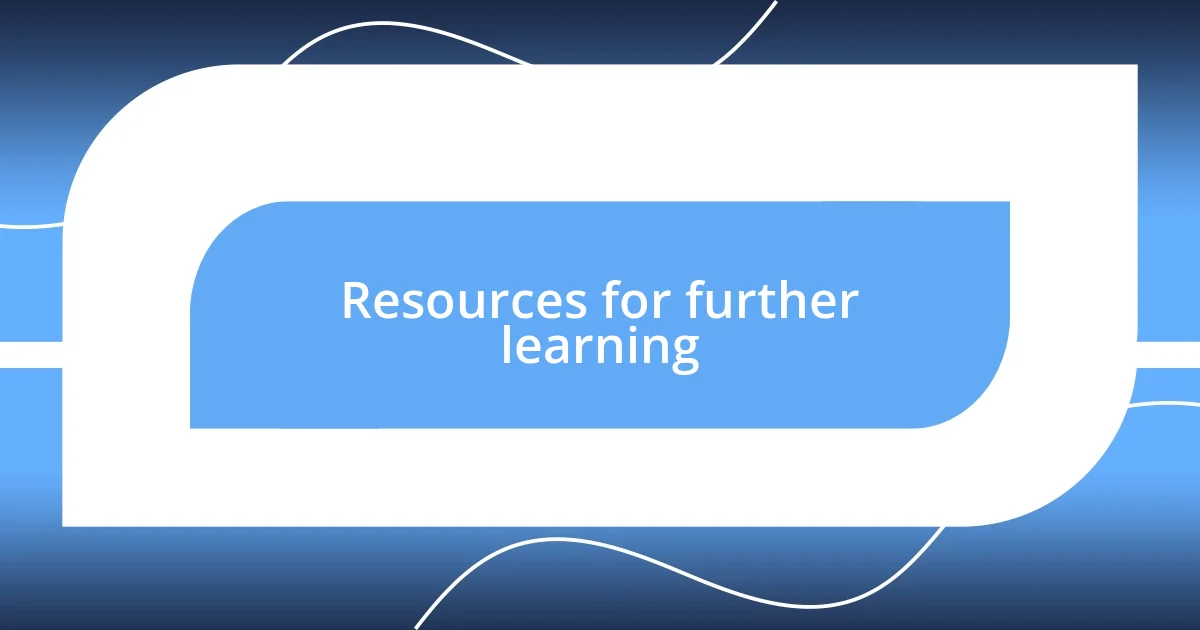
Resources for further learning
To deepen your understanding of language misconceptions, I highly recommend diving into a few insightful books. One that stands out is “Linguistic Justice” by Anne Charity Hudley and Jesse Planck. It challenged my thoughts on linguistic biases and opened my eyes to how we can foster inclusivity through language. Have you ever wondered how our everyday speech can impact social dynamics? This book offers practical frameworks for creating equitable dialogues.
Podcasts can be another fantastic resource. I discovered “Lingthusiasm,” which is all about the love of linguistics. Listening to hosts Gretchen McCulloch and Lauren Gawne sparked so many “Aha!” moments for me. They tackle misconceptions in a light-hearted manner, blending humor with education. Isn’t it fascinating how a friendly conversation can enlighten our understanding so effortlessly?
Lastly, consider joining online communities focused on language enthusiasts. Platforms like Reddit have threads where users share their experiences and challenge misconceptions together. I once participated in a language exchange forum where we discussed how different dialects affect identity. The stories people shared were so powerful! Isn’t it incredible how connecting with others can deepen our appreciation of language?





